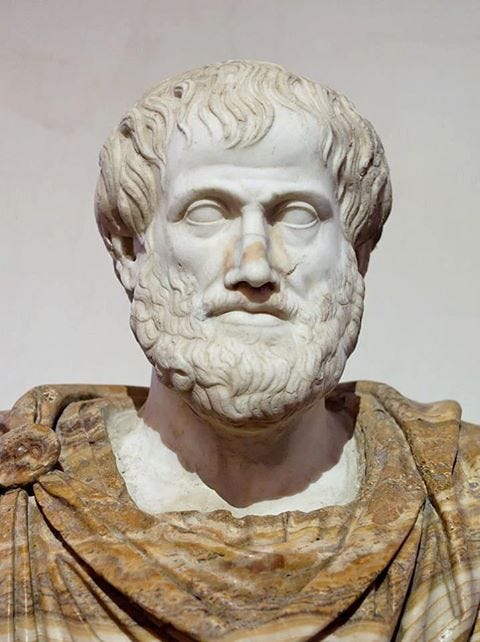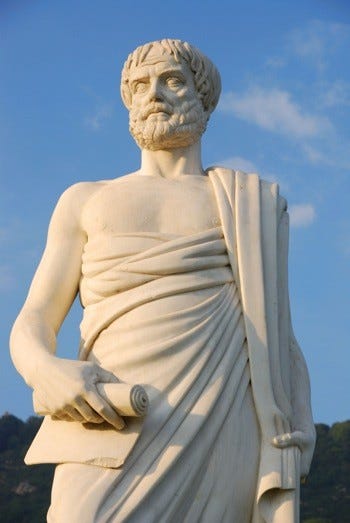Dear Classical Wisdom Reader,
It was Clint Eastwood’s Dirty Harry character who maybe said it best…
“You’ve got to ask yourself a question. ‘Do I feel lucky?’ Well, do ya, punk?”
Yet what is luck exactly? Is it even a real thing? Today’s article tackles those very questions! It looks at how Aristotle defined luck, as well as the distinction between luck and chance…
But unfortunately, we don’t know what Aristotle would have made of Dirty Harry!
All the best,
Sean Kelly
Managing Editor
Classical Wisdom
Aristotle on Luck and Chance
by Van Bryan
While Aristotle was most certainly a busy man (revolutionizing human thought can be rather time consuming), he still managed to carve some time out to tell us about the difference between luck and chance and the role these two things play within our universe.
Truth be told, the role of luck and chance had great importance to Aristotle. His examination of the topic comes about within Physics Book II. Aristotle is interested in what can be said to cause events. Luck and chance seem to play a role in creating events, so they certainly are worth exploring.
Aristotle begins by noting the criticisms of other philosophers. Some believe that luck and chance do not exist. How can it be said that something is caused by chance? It seems obvious enough that for every action there is a definite cause. Why must we concede that luck and chance play a role in causation when it would appear easy enough to point to any specific action as a cause?
Aristotle counters this by pointing out that the ideas of luck and chance are, at least in some way, universally accepted by human thought. How can something that does not exist be ever present in our minds? There must be some support for the ideas of luck and chance.
“Though people know perfectly well that everything that comes to be can be referred to some cause, as the old argument doing away with luck says, everyone nonetheless says that some of these things result from luck and that other do not.” -Aristotle, Physics
The philosopher continues by saying that yes, events are caused by specific preceding events, as is central to the argument against luck and chance. However, Aristotle points out that there are different types of preliminary actions that cause events.
The first type occur out of necessity, they simply must happen. The second type occur because they occur often, or regularly. However, there is a third type of event. This type of event occurs not out of necessity or by virtue of it regularly happening. It simply occurs. What to call such events? Aristotle calls them lucky.
To demonstrate this idea, let us imagine that you are standing in a field with a ball. For reasons known only to you, you throw the ball into the air with all of your strength. What will happen, obviously, is that the ball will eventually fall back to earth.
We would not say to ourselves, “Boy, we sure were lucky that gravity kicked in.” That seems absurd. The ball falling from the sky is an event that happens with necessity, that is to say it could happen no other way.
We can also note that the ball will most likely land somewhere in the field. Perhaps it will occasionally get caught in a tree or become stuck on somebody’s roof, but with regularity it will land somewhere nearby. This can not be said to be a lucky event.
However, let’s say you throw your ball into the air. All of the sudden a hawk swoops down and snatches it out of mid air and carries it away. Can we say that such an event is caused by necessity? Can we say that this event occurred with any regularity? Of course not. So we must conclude that such an action was caused by chance.
“First, then, we see that some things always, others usually, come about in the same way. Evidently luck and the result of luck are not said to be the cause of either of these things - either of what is of necessity and always or of what is usually.” -Aristotle, Physics
Well, okay then. It seems that we were wrong to doubt you, Aristotle. So now that we have seen that luck and chance are real and that they can be considered to be responsible for events, what exactly is the difference between the two? “I’m glad you asked,” said Aristotle’s ghost as it hovers above my keyboard.
It can be said that luck is a type of chance. However, not all chance is a type of luck. We must see that “chance” is the general term for coincidental causes. Luck, therefore, is a very specific type of chance.
The difference is that luck requires conscious decisions, an intent that is only possible with the intellect of a grown human being. In order for an event to be lucky, a person must attempt to accomplish some task. If in their pursuit of this task, they succeed by means of a coincidental cause, then the event is lucky.
Chance, on the other hand, is merely an occurrence that came to be out of the chaos of events. It has no purpose or end. Simply put, it just happened.
To demonstrate this, Aristotle gives the example of a man attempting to collect on a debt. Imagine that the man who is owed a debt seeks a debtor and coincidentally wanders into the market in search of this man. As chance, or luck, would have it, he does indeed come upon the debtor in the market and is then repaid what is owed to him.
However, if this man were to go into the market for any other reason, perhaps to purchase food or listen to Socrates lecture, and he then coincidentally comes upon the debtor, we would say that this was chance.
We can see that in the former example there is the element of human intent, of a willing decision. The second example possesses no such element, so it can not be said to be lucky.
Aristotle further strengthens this argument by saying that having good luck is similar to being happy. Since being happy is an action of sorts, we see that being lucky must in some way relate to human action and decision.
“For luck and its results are found in things that are capable of being fortunate and in general capable of action, and that is why luck must concern what is achievable by action.” -Aristotle, Physics
How does all of this fit in with philosophy? Why did Aristotle bother bringing this all up? In short, who the heck cares?
Well, Aristotle cared. More importantly, you should too.
Previously in Physics Book II, Aristotle had mentioned his rather famous “Four Causes.” At the very least, they are famous within the philosophical community. They are four causes that we use to examine a thing so that we might come closer to understanding its true form.
What is its matter? What form is it in? What prompted its initial motion? What is its purpose? These are the questions we must ask ourselves when examining a thing, whether it be a simple rock or the soul of a human being. If we can answer these questions, then we have the four causes, and we then have a better understanding of truth.
The third cause is of importance here. Aristotle has shown that luck and chance are ever present within our universe. This leads us to wonder about what things may have been caused by luck or chance. Could it be that the universe was created by chance? Is our existence nothing but a random outcome from innumerable variables? Does my life have any purpose or was it all by chance? Now you see how the little questions very quickly become big questions.
We do not have the answers for you this day. I’m sorry about that. We will have to be content with our new understanding of luck and chance and how we all fit in. Keep searching, dear reader. Keep philosophizing.
Who knows, you might get lucky.








As luck would have it, I chanced upon this interesting writing and thoughtful comments. Thank you.
Luck does not seem to depend on a human action with intention. After all, who would not consider it lucky (in the example given of the debtor in the grocery store) to run into the debtor without intending to look for them in the store? It’s “fortunate” even without going to the store specifically to look for the debtor. Maybe even more so. Equally, it would be unlucky (for the lender and debtor both) if the debtor were to be struck by lightening prior to paying the debt. The key element is whether or not the chance occurrence is felt subjectively as in one’s interests or not regardless of whether or not there was action and intention.